If you’re wondering what betta fish food, or how much and how often, you’re not alone. Surprisingly this is one of the most frequent questions when it comes to first-time betta keeping, and overfeeding is very common! To further complicate things, it’s not always wise to rely on the information from pet stores or on the food product labels either.
Bettas can be downright picky eaters too and tend to prefer eating food on the surface of the water instead of on the substrate of a tank. Bettas require a well-balanced diet that is rich in protein because they are primarily carnivores. It’s a myth that bettas can survive simply by feeding on the roots of plants.
Most betta keepers decide to feed pellets because they are simple and effective. Pellets create less mess and you can easily portion them out for feedings. Live, freeze-dried, or frozen foods can be used as treats or implemented into their daily feeding routine too.
To keep your betta happy and healthy please follow each food and feeding guideline below as these tips could literally save your fish’s life:
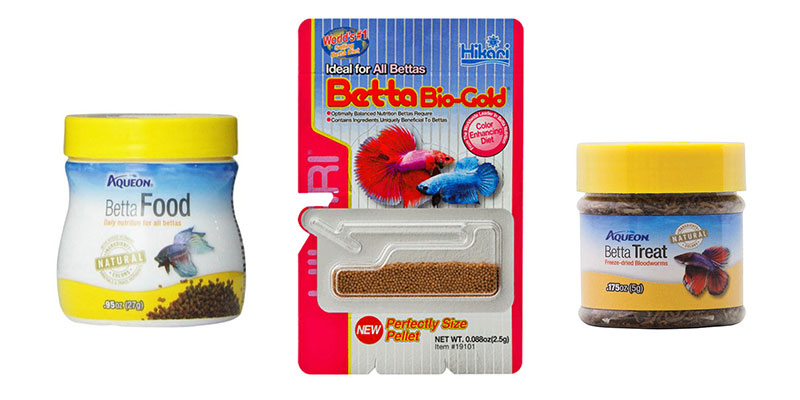
Best Betta Fish Food: Dietary Requirements
Betta fish are classified as carnivores, and eat insects in the wild. The best betta food replicates these specific dietary needs without a lot of added and indigestible fillers. For most betta keepers it may not be possible to source or provide live foods as a betta fish’s main diet. It’s best then, to provide a variety of high-quality pellets, flakes, freeze dried, frozen and live foods. Each is covered below.
Betta fish have very short digestive tracts and do not process fillers like corn and wheat very well. These fillers are often found in many pellet and flake foods and can lead to excess bloat and digestive issues (e.g. constipation). Betta’s receive no nutritional benefit from fillers and just pass them off as waste. It’s very important you provide foods high in protein to satisfy their carnivorous needs. Fiber and moisture are also important to aid their digestion.
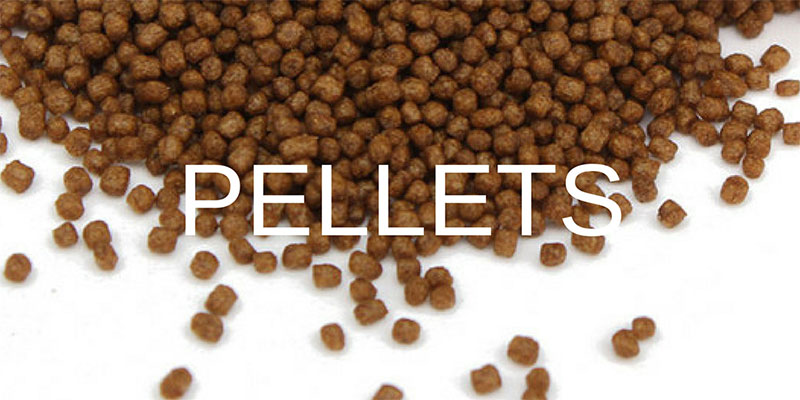
Betta Fish Pellets
Pellets are the most common betta fish food on the market, with quality varying greatly across each. The best pellets for betta fish will have fewer fillers and more high-quality ingredients that help fish thrive. Some betta fish pellets expand significantly after they are exposed to water.
This can cause bloating and digestive issues if you’re not careful as they’ll expand in your betta’s stomach. For pellets that expand once wet, soak them in tank water before feeding to hydrate them, especially if your betta attacks food instantly.
| Picture | Name | Analysis | Pros | Cons | Price | Rating |
|---|---|---|---|---|---|---|
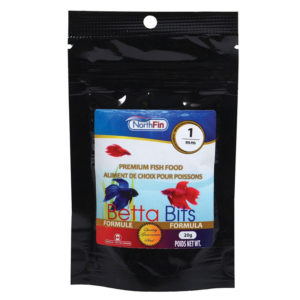 | NorthFin Betta Bits | -Crude Protein (min): 45% -Crude Fat (min): 16% -Crude Fiber (min): 4% -Moisture (max): 9% -Ash (max): 10% | -No fillers or hormones -No dyes or artificial coloring -Ideal 1mm size | - May be hard to find, except online | $$$$ | 5.0 |
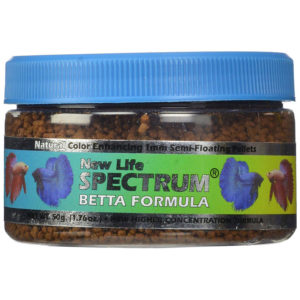 | New Life Spectrum Betta Formula | -Crude Protein (min): 37% -Crude Fat (min): 5% -Crude Fiber (max): 4% -Moisture (max): 10% -Ash (max): 8% | -Color enhancing ingredients -Doesn’t expand -High-quality ingredients -Almost no fillers -Does not cloud water | -Semi-floating may easily sink -Inconsistent pellet sizing | $$ | 4.7 |
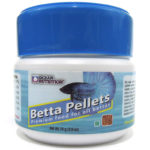 | Ocean Nutrition Betta Pellets | Crude Protein (min): 36% Crude Fat (min): 4.5% Crude Fiber (max): 5% Moisture (max): 8% Ash (max): 15% | -High in vitamins and protein -Small size and easy to digest -Does not cloud water -Color enhancing | -Large quantity -Freshness may expire before using -May not float for very long | $$$ | 4.4 |
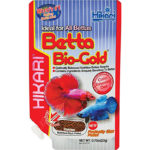 | Hikari Betta Bio-Gold | -Crude Protein (min): 38% -Crude Fat (min): 4% -Crude Fiber (min): 3% -Moisture (max): 10% -Ash (max): 12% | -Color enhancing ingredients -Small-sized pellets | -Fillers and artificial coloring -Difficulty dispensing | $$$ | 4.1 |
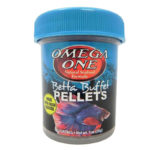 | Omega One Betta Buffet Pellets | -Crude Protein (min): 40% -Crude Fat (min): 5% -Crude Fiber (min): 2% -Moisture (max): 8.5% -Ash (max): 8% | -High in crude protein -Primary ingredient is salmon -Low in ash -Smaller pellet size | -Does not float for very long -Fillers and artificial colors -Pellet size may be inconsistent | $$ | 3.8 |
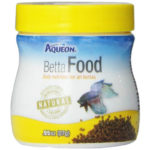 | Aqueon Betta Food | -Crude Protein (min): 38% -Crude Fat (min): 7% -Crude Fiber (max): 7% -Moisture (max): 8% -Phosphorous (min): 1% | -Small pellet size -Comes in color enhancing blend -Inexpensive | -A lot of fillers -Does not float very long -Tiny pellets | $ | 3.4 |
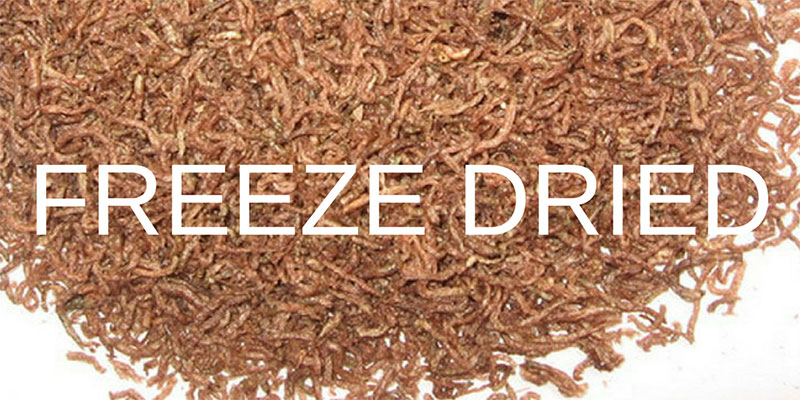
Freeze-Dried Betta Food
Freeze dried food is a great option to introduce some of the betta’s natural food into their diet, but it does not replace the quality of live or frozen foods. Freeze dried foods have been stripped of their moisture and have added fillers to keep them stable.
It’s recommended that you soak them in tank water before feeding to rehydrate them, increasing the moisture content. Feeding only freeze dried food can lead to bloating and constipation issues.
One large benefit to freeze dried foods, however, is they are free of bacteria and parasites.They are also easy to find at local fish stores and online and are relatively inexpensive. They store well and often come in your typical fish food containers.
| Picture | Name | Analysis | Price | Rating |
|---|---|---|---|---|
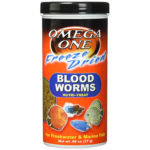 | Omega One Freeze-Dried Bloodworms | -Crude Protein (min): 55% -Crude Fat (min): 3% -Crude Fiber (max): 5% -Moisture (max): 5% | $$$ | 4.5 |
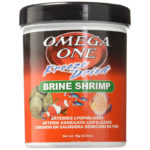 | Omega One Freeze-Dried Brine Shrimp | -Crude Protein (min): 48% -Crude Fat (min): 6% -Crude Fiber (max): 2.5% -Moisture (max): 5% | $$$ | 4.2 |
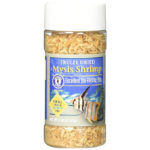 | San Francisco Bay Brands Freeze-Dried Mysis Shrimp | -Crude Protein (min): 67.3% -Crude Fat (min): 5% -Crude Fiber (max): 2.8% -Moisture (max): 8.4% -Ash (max): 10.8% | $$$ | 4.8 |
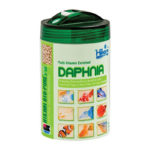 | Hikari Freeze-Dried Daphnia | -Crude Protein (min): 66% -Crude Fat (min): 9% -Crude Fiber (max): 5% -Moisture (max): 7% | $$$$ | 5.0 |
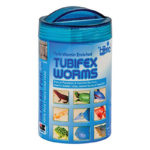 | Hikari Freeze-Dried Tubifex Worms | -Crude Protein (min): 60% -Crude Fat (min): 6.5% -Crude Fiber (max): 0.3% -Moisture (max): 6% | $$$ | 4.3 |
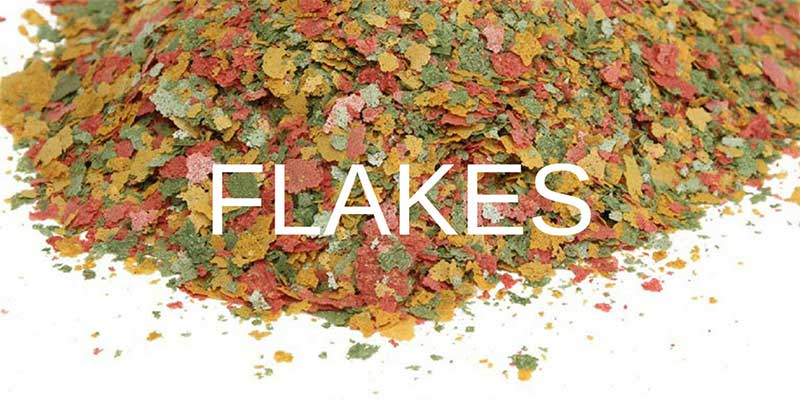
Betta Fish Flakes
There are specific flakes made specifically for betta fish. Do not feed your betta other tropical fish flakes because they lack the protein requirements bettas need. Betta flakes can be a staple in regular feedings, but they can also be very messy. Excess or sunken flakes should be removed immediately after feeding. Betta fish often refuse to eat flakes as well.
| Picture | Name | Analysis | Price | Rating |
|---|---|---|---|---|
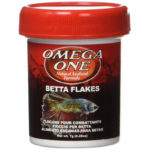 | Omega One Betta Flakes | -Crude Protein (min): 43% -Crude Fat (min): 12% -Crude Fiber (max): 2% -Moisture (max): 8.5% -Ash (max): 8% | $$ | 3.1 |
 | Tetra BettaMin | -Crude Protein (min): 48% -Crude Fat (min): 8.5% -Crude Fiber (max): 1.5% -Moisture (max): 7% -Phosphorus (min): 1.1% | $$ | 2.5 |
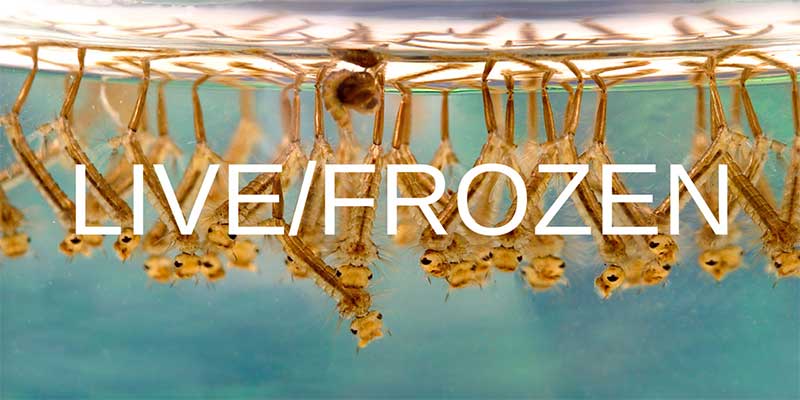
Live & Frozen Betta Food
If you’ve never fed your betta anything other than pellets then you and your betta are missing out. Betta fish are carnivores and they get increasingly aggressive during feedings when they have to stalk their prey. This is also the best way to replicate their natural habitat and food sources.
Some are harder to source than others but make for a balanced diet. Be careful of where you source your live and frozen foods from, as they may carry parasites and other diseases. Never feed your betta something you caught outdoors either.
Frozen foods come in many of the same options. It’s a great alternative to keeping live food. Frozen betta food may be kept in your freezer until you’re ready to defrost and feed them to your betta. Only take as much as you need placing the rest back into the freezer to prevent thawing. Never refreeze any food that has been thawed as it could have been exposed to bacteria.
These options below are a betta’s favorites:
1. Live/Frozen Mosquito Larvae
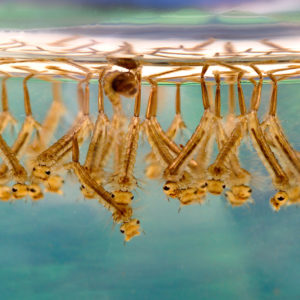
A staple in their natural habitat, mosquito larvae are an excellent betta food option. While they may be hard to source during the winter months, mosquitos and their larvae are very active and abundant during spring and summer and in warmer climates. Purchase a starter culture and harvest them yourself, or find a reputable local or online store that carries them.
2. Live/Frozen Brine Shrimp
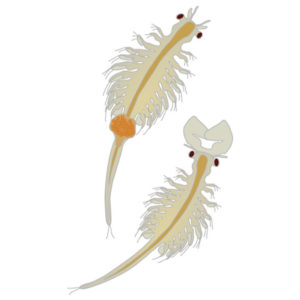
Brine shrimp are an aquatic crustacean that betta fish love. The photo above is zoomed in, from the University of Utah, they only grow up to 1 centimeter as adults. Brine shrimp are packed with the nutritional needs that betta fish need to thrive on (proteins, vitamins, and amino acids), and they’re easy to raise too. They can also be found at most local fish stores, making them a good option for varying up your betta’s diet.
3. Live/Frozen Bloodworms
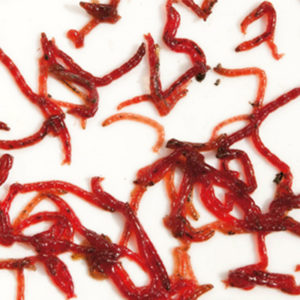
Bloodworms or Glycera are the larvae of the midge fly and can be found in pools and ponds of water. Betta fish commonly gorge on them in the wild, making them ideal variations for even the pickiest of eaters. Betta’s put on a big show when going after these guys, but they shouldn’t be used as the exclusive source of food because they lack amino acids. They are high in iron content, resulting in their bright red coloring. If you can’t handle the live option (they are pretty gross looking), they also come in a gel or freeze-dried option.
4. Live/Frozen Wingless Fruit Flies
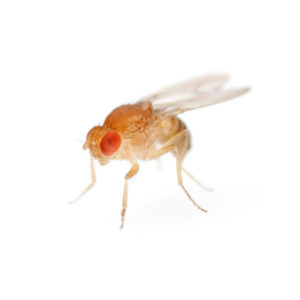
Also known as the vinegar fly, the common fruit fly is something you are probably very familiar with. Have you ever left bananas, apples or other fruit out in your kitchen, and all of a sudden there’s swarms of little bugs flying around them? Those are fruit flies and betta fish love them because they are insectivores. While you can technically drop them in for feeding, you don’t know what diseases they may have and they may fly out. Instead, there is a wingless and flightless variety that is ideal for feeding betta fish and can even be bred and harvested in a small container inexpensively.
5. Live/Frozen Mysis Shrimp
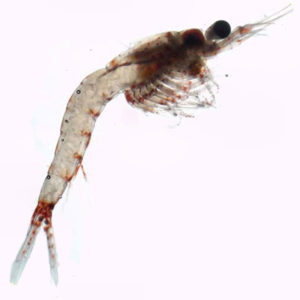
Mysis shrimp, or opossum shrimp, are another great option for betta fish because of their exoskeleton. This exterior is rich in fiber, which aids the digestion of protein-rich foods. If your betta fish is a picky eater, these guys might do the trick for some variety. They are packed with betta-loving nutrients, more so than brine shrimp, and are also high in moisture and amino acids.
How Much & How Often to Feed a Betta Fish?
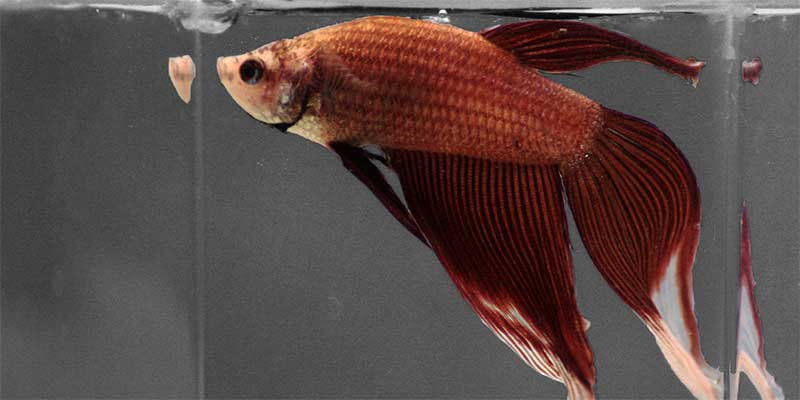
Pay no attention to the amount and instructions on the side of the betta fish food can. These directions are often very misleading and can cause problems with your betta and the water quality in your tank. Typical feeding instructions say to feed as much as your fish will consume in 5 minutes, or to feed several times daily in amounts that can be consumed in 3 minutes. This is not recommended and will lead to overfeeding and excess waste.
- Betta fish pellets (2-4 pellets, 1-2 times daily)
- Live, frozen, or freeze-dried (2-3 pieces, 1-2 times daily)
Adult bettas can be fed once per day, and babies (fry) can be fed twice per day. It might not seem like enough, but many pellets expand to more than 2X their size once they get wet. To put this into further perspective, a betta fish’s stomach is roughly the size of their eye! Additional feedings may be necessary depending on the activity level and personality of your betta.
Bettas will overeat if you let them. Overfeeding and overeating can lead to constipation, bloating, obesity (that’s right betta fish can get fat), swim bladder problems, contracting diseases because of the bacteria feeding on the excess food breaking down, and even death.
Ideal Feeding Schedule:
- Monday: Betta fish pellets (2-4 pellets, 1-2 times daily)
- Tuesday: Live, frozen, or freeze-dried (2-3 pieces, 1-2 times daily)
- Wednesday: Betta fish pellets (2-4 pellets, 1-2 times daily)
- Thursday: Betta fish pellets (2-4 pellets, 1-2 times daily)
- Friday: Live, frozen, or freeze-dried (2-3 pieces, 1-2 times daily)
- Saturday: Betta fish pellets (2-4 pellets, 1-2 times daily)
- Sunday: Fast to keep digestive regularity
Always clean up any excess food that falls to the bottom of the tank with an aquarium designated turkey baster. This will prevent ammonia buildup and the potential for harmful diseases being present from food decay.
It’s also a good idea to not feed your betta one day per week, this gives their digestive tract time to fully process food and it limits problems associated with overeating. If you’re going to be gone for a day or two, or on vacation, don’t pour extra betta food in either.
Extra feeding will lead to overeating or they may not eat the excess at all. If you want to know how long betta fish can go without food too, it’s actually 14 days. Therefore, it’s always better not to feed your betta over the weekend or for a day or two than it is to feed them extra.
What If Your Betta Fish Won’t Eat?
If your betta fish won’t eat or seems completely uninterested in food don’t worry. A lack of appetite may mean that they are not hungry or have recently undergone some type of stress (e.g. tank cleaning, new home, abrupt water temperature changes). Again, don’t worry about a couple days because bettas can survive up to 14 days without food.
Cold water that is outside of the recommended range of 76-81 degrees Fahrenheit may also cause your betta to act lethargic and will slow their metabolism. A lower metabolism means they will need fewer feedings. As betta fish get older they will also be less active and may eat less frequently, this is normal.
If your betta isn’t eating it may also be a sign of illness. Just like when we are sick, betta fish also won’t have big appetites while they are ill. Make sure to monitor for signs of illness and disease, and initiate the proper treatments as soon as possible.
Once a betta recovers, their appetite will also begin to come back too. As mentioned above bettas can be picky too. If you notice your betta fish spitting out his or her food, or turns away from it, you may need to try a different kind or brand.
Recap
That’s a lot of information to digest, but as a betta keeper, it is our responsibility to make sure they have a well-balanced diet for optimal health. Myths exist regarding live foods causing constipation and bloating. This can happen, but it’s normally from a lack of fiber in the betta’s diet, or overfeeding.
Remember, betta fish may eat even if they are not hungry. In the wild, betta fish may not know when their next meal is, so their instinct is to continue eating while food is available.
Ranked in order, the best betta food is live, frozen, freeze-dried, pellets, and flakes. Feeding a variety of different foods will provide the array of nutrients a betta fish needs to thrive.
How much to feed your betta fish can depend on their individual activity level, but 2-3 pellets 1-2 times daily is a safe amount. Get in the habit of sticking to a regular feeding schedule so that you don’t forget whether or not you fed them.
Please ask any questions you may still have about specific betta fish food and feeding procedures in the comments below.

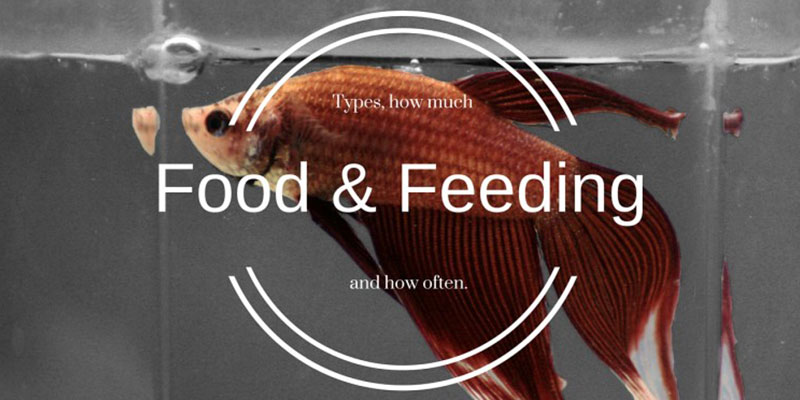

Thanks so much for this info! I just got my Crown Tail Betta 3 days ago and he still hasn’t eaten. Makes sense now, he’s getting used to his environment.
Awesome website, btw!
You’re welcome Summer! That’s awesome I’m glad I could help and I love crowntail’s. Thank you for the feedback and let me know if you have any further questions.
I have 2 crowntail bettas. I have one is is very lethargic, won’t eat and doesn’t swim much. Then the other one swims around like crazy and I’ll feed him when he goes to the top of the tank and he’ll stay there like he’s waiting for food. Will I over feed him if I give him food every time he does that? I got them a week ago
Yes you can overfeed them by doing that and bettas are curious and like to greet their owners at the surface too. Use your best judgment as very active betta fish will need food more often. Watch out for signs of constipation or overfeeding and adjust feeding as needed.
Great information!
Thanks.
I have a health question about our beta.
She lays on the bottom, always on her side, or in the plastic leaf on the surface most of the time.
Her belly is often above water level when she’s on the beta leaf.
She eats, but only when ‘’finger fed”.
She’s in a 5 gallon, half filled tank. With a heater-76.6*.
Water changes weekly.
Kyorin or Topfin pellets. 3-6 per day.
Please, if you have any advice to help her (Violet) we’ll do anything that you recommend!
Thanks so much,
#VioletsLikeOurDog!
Thanks Kayla. About how old is she? As bettas get older they do become less active. My female does a ton of just lounging around like that, staying at the surface area on her side on the leaf hammock, but she flies off of it when I drop some pellets in there. She’s always had a huge appetite though.
Bryan my little sister just bought a crown betta but didn’t buy food and its been like 3 days and we cant go back into that part of town for like 4 weeks do you have any ideas for a common alternative food source?
They have specific dietary needs, especially for that long of a duration – a month is a long time without proper nutrition. Can you order food online and have it shipped to you? If it’s a matter of life and death and you need to get by that long you could feed boiled peas with skin removed and some tuna fish that comes in water with no preservatives but not daily. Or a tiny piece of some small shrimp. Also fruit flies and if you can find any mosquito larvae. Please try to help your sister understand the importance of caring for something and getting everything they need to live.
I recently got a female beta, can’t remember exactly which one, but the tank I’ve purchased from the store leaked a bunch, so overnight I had to keep treating water in adding it to the tank to keep it full and then switch to a new tank the next day, but I’m worried that that stress And the overfeeding may have negatively affected the Fish.She just goes to the top of the tank behind the filter and floods there and won’t move for long periods of time and her stomach looks a little bloated to me, although this is my first fish so I have nothing to base this off of
Hi Kyle. The constant change in water parameters during that time could have stressed her out. If she was overfed, you can fast her (no food) for 2-3 days and see if her bloating improves.
Thanks for your comment. I just got my crown tail yesterday. He will not eat either. But he is active. I was worried like yourself. Again thanks.
Wow! This is super helpful! I just got my betta, Carl, yesterday. He’s really ‘jumpy’ and won’t eat anything. Now I know why!
Nice to meet you and Carl. Betta fish can definitely be temperamental with food and eating once you first get them home!
We feed our beta every three days. We give her flakes. we found that feeding her every day, she would get the puffy stomach and ends up on her side.
We try to feed her a tiny amount but sometimes it is hit or miss. For instance, right now she is on her side with a big tummy!
We go on vacation soon too! We found vacation pellets. Her aquarium is a 1.5gallon tank and there is no air stone or anything like that.
We have given her a tiny bit of pea to help with the bloating. What are we doing wrong?
Hi Linda! How much are you feeding her when you do give her flakes? I would recommend pellets though as they are easier to consistently measure compared to flakes. You are likely still overfeeding and causing constipation and bloating which leads to swim bladder issues (floating). For pellets it’s only recommended 2-3 per feeding, and in most cases one to two times per day is adequate. All fish respond differently and have different levels of activity so that is important to keep in mind too for appetite. I would also encourage you to get a larger tank for a proper habitat. As for vacation, read our guide on that here. 🙂
Oh my gosh. Is my betta going to die? I’ve been feeding him like eight pellets daily and today I fed him ten because I’m about to leave him alone for six days. Also, my house is always around 60 degrees.
No your betta is not going to die. Some bettas depending on activity levels will be okay eating more or even need more, but overfeeding over time can lead to health problems and constipation. If your house is that cold, you should definitely have a heater for his or her tank.
I haven’t fed my fish in a week so is that bad
Yes
I was told at the pet store to not feed my Betta more than two to three times a week and I am feeding my male aqueon the betta food/treat which was supposed to have the more vitamin protein that they needed …obviously they told me wrong then I’m assuming your thoughts on this?
PS. I have been feeding it more lately because I see the energy level going down and then pops right back up when I feed him for a guy LOL!!
Cheryl, one thing you’ll see me say is that all bettas are different. If a betta is very active, they may need more food, whereas if they are the lazier type, they may need the lower of my recommendation and only fed once per day. In my opinion and experience, 2 or even 3 times a week is not enough. I like to keep a varied diet, small portions per feeding, and fast one day per week, or more if I ever see any signs of constipation.
I have a community tank that I had 9 female bettas in it, now it only has 5 🙁 I’ve kept male bettas and only fed them betta food but with these I was feeding regular flake food. Well I lost 4 to dropsy and I’m now convinced it was the food. I blame myself because I should’ve known better! It’s a tough loss but a valuable lesson learned. I’ve ordered freeze dried daphnia and a flake food that has no additives (it’s beef heart and blackworm mix, with no wheat etc in it) so that my other fish in the tank can eat it too. I also have frozen mysis shrimp for my salt tank that I can feed them in the mean time.
Do you trust any of those multi day feeders that you leave in the tank and it gradually breaks apart to release food?
I have done this for 3-4 day trips & my betas (all male) are fine and live for 4 years or more! However, I will say water is nasty when I get home and needs changing right away…they are “hardier” than you think!
Thanks for the helpful information! We just got two betta fish about a week ago. One fish loves to eat and inhales the pellets instantly. The other fish seems to have trouble eating the pellets. He will approach them and appear to try to eat them, but many of them don’t make it into his mouth. He will lunge at them several times before they sink to the bottom. Occasionally, he will be able to catch them in he way down. It seems as though the pellets are too big or his mouth is either too small or has some sort of deformity, making it difficult to eat. The pellets are the Aqueon brand. Do you have any suggestions? I was thinking of trying the flakes.
You bet! Yeah you can try flakes and see how that goes. You could also try soaking the aqueon pellets until it’s saturated and then add it and see if it’s easier to break up and get at.
My betta is getting a little bloated and I feed him a little bit of betta flakes and he still won’t get better my friends say he is stunting because I have a to small tank but it is a 5 gallon is that to small if so should I get a bigger tank?
5-gallons is an excellent size. If your betta is bloated you may be overfeeding him. It’s common with flakes because they are hard to portion out compared to pellets.
Even if you feed your Betta a little amount of flakes, it depends on the ingredients. The flakes should contain more protein than other ingredients, also the moisture level should be moderate. Regards to your tank, a 5 gallon tank is not small. Actually any tank 3 gallons or smaller is too small for a Betta
I have had my two betta fish for about 12 days. I have 2 females and they are in a 5.5 gal tank with a divider. This weekend I noticed that Athena’s side of the tank was a little more murky and had a clear film on top of the water. Jade’s side of the tank (her side has the filter) was fine so for some reason the divider wasn’t letting the water filter through like it is supposed to. So I removed the divider and cut slits in it so the water could filter through. They were in the tank together for about 10-15 min and followed each other around and flared their gills but did not attack or hurt each other. I placed the divided back in the tank and ever since, Athena has been acting weird. First she was sitting on the bottom of the tank, hiding in her pineapple decoration and would only come up for air, and then go back down to the bottom. Her fins are pressed against her body. Now she is staying on the top corners of the tank and looks terrible. She has been sitting on top of her plant so she doesn’t have to come up far for air, and isn’t eating much. She ate a little last night but didn’t eat anything this morning. Jade is doing great and is eating normal. I was going to change out the water today, but will that make Athena worse?? I don’t know what I should do. Before I had them in the tank together, Athena was fine and swimming around and was very happy. Yesterday something went wrong with the heater and the temperature went down to 70 degrees. I gradually moved it up one notch and now the water is back to 77 degrees. I am going to the petstore to get a new heater since my current one is about three years old, is there anything else I can do?? I had a tetra fish for three years, but Athena is doing so terrible. PLEASE HELP!!
What happened to Athena?
My fish has totally slowed down and it’s only about 65 degrees in my house so I am assuming this is why. Will he be ok all winter?
If he’s become lethargic and it’s 65 degrees in your house, you should get a heater with a built-in thermostat if you don’t already have one. This will help to maintain a tropical habitat for your betta of around 78 degrees Fahrenheit.
I recommend you to get a heater, because the water will get colder than your house, remember that a Betta tanks water should be within the temperatures of 76°Fahrenheit to 80°Fahrenheit
When I go away on short trips for about 3.5 days, I sometimes come home to find my betta in almost a hibernating – trance-like state. He’s over 3 years old and it seems like he doesn’t do well when left to not eat for that long. I usually feed him 1 pellet twice a day. Before I leave I usually give him 2-3 pellets right before.
Do you think it’s ok to do this? I saw the comment that they can go 14 days without food! Wow!! I’d never leave mine for that long…
Bryan, which country are you in? Been into betta alot lately!
The United States
Hey Bryan I got a betta about a week ago and he nearly died yesterday because he jumped out of his tank. So would he be stressed and not eating by any chance?
Yes, this is very common for those who use tanks without lids. I hope your betta recovers from the stress and begins eating normally again.
Hello! I bought my Betta a little over a week ago. I bought him pellets that are the brand “top fin.” According to the label and your post it has all the right things in it. He ate two pellets the first day I got him and has not eaten ever since…. I’m worried it’s been over a week since he’s eaten. He’s a very active fish and loves swimming all over. Not for sure if I should buy new pellets :/
If he’s still active, healthy, and spitting out the pellets, I would try a different brand.
Thanks for all the info on this site!
I have a question about feeding frozen foods that come in cubes.
How does one know how much of a cube to break off to feed a betta? When feeding freeze-dried, I usually give 2 good sized worms for a meal (the other meal that day would be pellets.)
Thanks
Thanks, Leah! Try to break off and only feed the amount you would normally 2-3 worms. If he’s not bloated or constipated, you should be fine.
Hi! I am so excited I found this site. Your information has been a huge resource for me.
My daughter got a crown tail Betta 12 days ago. He has been unwilling to eat Betta pellets. He also rejected frozen brine shrimp. I gave him frozen bloodworms today and he finally ate! First time in 12 days. He had gone almost colorless and is finally getting his color back this afternoon.
Will it hurt for him to eat only bloodworms? I did order two different types of pellets to try as well.
Thank you Amy! The best diet is a varied one. It could lead to long-term issues like bloating and constipation and not getting other essential nutrients that pellets provide by only feeding bloodworms. Keep trying different types of pellets, and in the meantime continue to feed the bloodworms if he’s regaining strength/color and eating.
Hi!
I will be going on vacation from a Sunday to a Sunday – I was planning on buying an auto fish feeder, will that be necessary if they can go 14 days without food? Realistically, he would only be without food for 6 days versus eight because I’ll feed him before I leave and once I return
Thanks.
Did you read the vacation care guide yet? 6 days should be fine, I wouldn’t go any longer than that.
I realized there was that section after I posted to this page! Would you be able to help me with another issue though? I just posted on bettafish.com but they want me to upload the video to youtube (I don’t want to make a channel for one video). If you go on that website, my user name is Fredz
Hi,
Thanks for this great article and the website. I got a Veiltail Betta male fish for my first-ever fish tank couple of weeks ago. It is a 3-gallon tank. I have a couple of queries, please.
1) About feeding: I am feeding my fish with Aqueon betta food pellets. Feeding frequency is 2 pellets in the morning and 1 pellet in the evening; 6 days a week with fasting on the 7th day. I realized recently that the bottle expiry date is Nov. 2017. A friend of mine (who has vast experience with fish tanks) said that it is fine to continue using this food. Online articles do not provide a clear take on the usage of expired food pellets. Can you provide your insights on this topic or comment on my situation?
2) About potential sickness of my fish: This is probably a query for a different article but let me mention it here. My fish seem to be less active since past 1.5 days. I am trying to figure out if it is any form of sickness so that I can take care of him ASAP. Earlier, he used to swim around all day without much break. But since around 1.5 days, he has been taking a lot of breaks in between swimming – either by hiding under the plant in my tank or by simply laying on the sand. Further, I observed that his tail has black edges making me wonder if he has “Fin and Tail Rot” disease. How can I ensure if he has any sickness? Is it fine to treat him without confirming the sickness, e.g., for fin and tail rot disease?
Please feel free to ask for additional information as required. Thanks!
Thanks Suresh! With the cost of food being relatively inexpensive, I always recommend not using pellets past their expiration date, and simply buying new. They could be fine, but they could also be lacking in moisture and not as nutritious at that point which can lead to issues. As for the 2nd question, black edges are a beginning sign of fin rot, I would do at least a 50% water change, and if things don’t improve, you may need to dose in some Aquarium Salt. You can visit the Fin Rot page under the Diseases Menu/page for more information. All the best!
Thanks for the response, Bryan! I will follow your suggestions and see how it goes.
How long can a beta go without eating. Sometimes we take a vacation for two weeks.
The maximum is 14 days, but that’s to the point of starvation and death. If you are gone that long, please read the vacation guide here.
My female veiltail Pearl goes NUTS for those Northfin betta pellets. They sink and a lot of ppl complain their betta doesn’t find them but Pearl is another story. If they sink to the bottom of her tank she HUNTS them and she is so good at finding them! These pellets are smaller than other pellets I’ve seen on the market so I generally feed her 4-6 pellets twice a day. She is active with lots of personality and I bought her while she was young and not as colorful. These pellets brought out a sheen I had never seen in her before, and that blue reflectiveness on her opaque body is why I named her Pearl, she literally shines like one! She’s gotten so long since I fed these to her, I think she was a juvenile when I bought her at PetSmart. She was nearly transparent in color and I was afraid no one would want her so I bought her, so glad I did she is so vivacious, she’ll jump and eat food right off my fingertip. I also give freeze dried bloodworms and brine shrimp treats. Although I was never sure how often to “treat” her. The schedule you posted was very enlightening, now I know how often to give her the other food. Thanks!
How do I know if my baby betta is constipated or his tummy is just normal size? So worried!
If you are feeding proper amounts and high-quality food you shouldn’t have to worry about constipation, but things do happen! Here are a couple signs: Long stringy poop, or not pooping at all. Inability to regulate in the water (sink or float) when they stop swimming or swimming upside down. Baby’s stomachs will often appear large because they haven’t fully developed their body or fins yet too. Check out the chart on this page showing pictures of the progression visually with approximate age.
I have 2 male bettas that have a divided tank and I bought some freeze-dried bloodworms and feed it to them. My fish (Luca) really enjoyed it, however (Hot Cheeto) only ate about 2 pieces and didn’t really eat the rest I had in there.So I gave Hot Cheeto the pellets instead. Should I have given him pellets after the bloodworms? And is it normal for him not to enjoy eating the bloodworms since most bettas do enjoy it?
You did everything just fine, and yes, it’s normal for different betta fish to have different food preferences. One of my male halfmoons won’t touch bloodworms, yet the others ravish them.
Bryan,
This is a wonderful article – Answers a whole bunch of questions at once. I have two additional questions. #1: How do you interpret it when they show interest in the pellet, spit the pellet back out then eat it again? It almost looks like they can’t keep it in. We’re feeding Beta Bio-Gold. #2: How do the feeding recommendations change when conditioning for breeding?
Hi Caroline. #1 – This could mean they aren’t interested or don’t like the pellet very much, or it could mean the pellet is too large and the betta is trying to break it up by biting it and spitting it out several times. Does the betta attack the food instantly? If so, you could try soaking the pellet in some tank water for a minute or so to soften it up before adding it to the tank. #2 – I have not completed my breeding page yet, however you would need to start introducing higher quality food sources.
Hi, what if i don’t have a baster to take out the food thats at the bottom of the fish bowl? Its a small one. Also, is it okay to put warm water in when I take out the 1/3 of water in the fish bowl? Thank you!
If you don’t have a small gravel vacuum or baster, you will have to do a 100% change more frequently to get rid of the excess food and waste. Ideally, you want to add water that is the same temperature as the fish tank. So if your tank water is 78 degrees Fahrenheit, you’d want to get the water you’re adding as close to that as possible.
So I got my betta a few months ago. I’ve had two other ones before, but they both died of parasites. I had them in front of my window so I’m pretty sure it’s because they got to much light. I feed the one I have now Tetra BettaMin flakes. When I got him the person at the store said I should feed him twice a week. I have been doing that and he seems to be pretty active and healthy but when I feed him he seems really hungry. Should I feed him more often?
Twice a week seems very sparse, especially if your betta is active. I only recommend fasting for one day during normal conditions.
Your site has been the best for giving ALL information needed for having the best care for your betta.
My betta, Bernard, has not been looking well for 3 days. From your description he has Hole in the Head virus. Your reasons were lack of proper water and food care. He has been doing great in the 6 weeks that I have had him. I “rescued” him from a friend who was being negligent with him. After having him for 3 days he started looking brighter more active and showing personality. Although I now realize I have been over feeding him.
The only thing I have done differently in the past week was to buy water conditioner. I was giving him tap water that I had left out for 24 hours to remove chlorine etc. What have I done to cause this? He is an older Betta.
Considering getting a Betta.
You have written how to feed them pellets, live, frozen, or freeze-dried but not flakes.
My roommate once had a very picky betta that would only eat flakes. Bubbles Mcbubbles lived for 4 years and ignored every other food we offered him (though we didn’t try live or frozen in a college dorm). If that turns to be the case I want to know what amount (assuming 1-2 times daily) is best.
I would suggest roughly 3-4 flakes per feeding and monitor from there, adjusting as necessary.
Thx so much for this information, it’s a nice reference for a complete betta newbie like me. 🙂
I just got my betta, and he is on the small side. This may be an obvious question, but I’m going to ask it anyway 😛 … Should I assume that a smaller fish means I should be feeding closer to the 2 pellets twice daily rather than 4?
Try 3 and see how that goes! If you see any stringy poop or stomach bloating then you’ll know it’s too much.
Thanks so much, Bryan! I just got a betta for my desk at work and wanted to confirm whether he’d be OK without food for the weekend, or would need to be transported home. Sounds like he’ll be good; but, I’ll be sure to give him a final snack before I leave on Fridays.
We got a baby Betta a couple of weeks ago and I wish I would have found your website then. Super helpful!! The pet store said to feed him every other day, but from what I’m reading here is looks like we should be feeding him twice a day. Poor guy! We’ll step that up! We also have been feeding him flakes, but I’m going to order some pellets and start including some live food too. My husband went to the store today to get bloodworms, but they were out and they told him to buy beef heart. What are your thoughts on this for Betta’s? It’s not on your recommended food list and everything I’ve found on the internet says NOT to feed it to them because it’s not a natural food. Would love your opinion. Thanks!
Hi Kathy – baby betta fish are extra sensitive to care for, so I would only feed them small, high-quality pellets, and natural small live foods.
I have to go on vacation soon and will be gone for five days but can’t find anyone to take care of my fish (Gary). Would it be ok to not feed him?
Hi Eli, please read the vacation care guide here.
Is it ok to feed my Betta mosquito larva that I find in my yard, ie buckets, puddles?
Theoretically? Sure. However, you never know what bacteria or diseases they or the water they are in have. For that reason, I wouldn’t personally take that risk unless I controlled the environment of the larvae.
If it’s a baby I don’t know how much food he supposed to eat. You told me.
I’ve had my male half moon, his name is Georgie, for about five months now. He lives by himself in a five gallon, filtered, heated tank. He appeared to be fairly normal in size when I got him, but has since grown to a little over three and a half inches. Is this normal? When I first got him, I followed the feeding schedule that is on this site, but he kept eating his tail whenever I tried to fast him which led to tail infections. He is also a very picky eater. He hates blood worms and brine shrimp. He will try to eat them, then spit them back out. I really didn’t want to give him flake food, it makes the tank so dirty and doesn’t seem too nutritionally sound. He does like pellets. I have been alternating between three different kinds of pellets. Is his diet varied enough? Also he is extremely active and eats about ten pellets a day. He has been on this feeding schedule for about two months now and the tail eating has completely stopped and I haven’t noticed any signs of bloating, inability to swim, or constipation. Will this eventually have any ill affects on his health, though? He has quite the personality, not shy at all. He greets everybody who talks to him, including my cats. I would hate to do anything that might shorten his life.
Picky eaters are very common among bettas. Varying the different pellets, as long as they’re high quality, should be just fine. My halfmoon won’t touch brine shrimp or bloodworms either. As he ages, you may find you can feed him a lot less as that does sound like a lot of pellets – without experiencing his activity levels personally. Also, boredom can sometimes be caused by a habitat that is void of places to explore and you can also use specific ‘toys’ (examples: floating ball, brief mirror exposure) to cure boredom too.
Thanks for the advice. The first thing I did after his tail eating started was to get him some ping pong balls and one of those floating mirror things. He completely ignores the mirror, doesn’t react at all, it’s weird. He will push the ball around for awhile, but he seems to prefer zipping around his plants. He has two small silk plants and one tall but not super big silk plant. He also has a broken vase cave thing that he loves swimming in and out of. I rearrange his tank about once a month so he can re-explore his environment. The tail eating still continued. It really seemed to center around his food. If I was late feeding him, he would start to eat his tail. I have to be very precise about the time I feed him. Six of his daily pellets are Hikari Betta Bio-Gold, two are API Betta pellets, and the other two are Tetra Betta pellets. He gets three of the Hikari with two API in the morning and three Hikari with two Tetra at night. When should I start trying to lower the amount of food he eats?
All betta fish are different, but it sounds like you’re doing the best you can. I had a persistent tail biter in the past too, no matter what I did. If you start to notice he is bloated or constipated frequently after feedings, that would be a time to reduce the amount he eats.
I just bought a female crowntail betta. She seriously looks bloated. I managed to get her to eat two pellets (TopFin), after observing her at the bottom of her tank sucking stuff up and spitting it out. Thought she might be hungry. Anyhow, the pellets seem too big for her mouth right now. I don’t really want to use flakes since she appears to be bloated already. Like many ppl, I don’t want to over feed her. Any suggestions?
I would try switching to a smaller pellet, Glenda, like Hikari Betta Bio Gold listed above.
Hi! I just bought a female Elephant Ear Betta at Petco, and I was kind of concerned about her. Since I put her in my tank, she’s been nibbling at my plant in the corner of my tank and it looks like she’s eating something off of it. Is it normal for Bettas to do this or should I be concerned? Also, do the Aqueon Betta Pellets expand in the water or should I be soaking them before I feed them to her? I’m worried that they’ll expand in her stomach since she snaps them up pretty quickly. Do you have any advice?
Are there any small nerite snails on the plant she may be eating? Sometimes they can hitchhike their way from the live plant tank to your tank. Betta fish don’t usually eat live plants. Either way, it shouldn’t hurt her. Yes, all pellets expand. You should soak the pellets for a couple minutes in tank water if she’s eating them as soon as they hitting the water’s surface. It will help with digestion.
Do the 3-4 pellets per day vary depending on your brand? I recently purchased a betta and I’m using the Ocean Nutrition betta pellets and I want to make sure I am not under feeding my betta. The pellets look a little on the small side. You mentioned an ideal 1mm size in this article and I’m just wondering how you adjust your feeding amount if your pellets are not 1mm.
It can vary by brand, but the smaller pellets are ideal. If you want to see how much food he’s actually getting, take 4 pellets and soak them in tank water in a separate container for 3-4 minutes and see how large they expand to. With that in mind, a betta’s stomach is roughly the size of their eye. It will give you a good indication of whether you want to feed more/less or once or twice a day.
Hello,
I have a question regarding frozen blood worms. I bought frozen blood worms that come in cubes, once I thaw a cube and feed my betta one or two worms can I put the rest of the worms in the fridge and keep feeding from it for a couple days or do I need to toss the remaining worms?
Thank you for all the great info!
-Sara
Hey Sara, you can cut the cube up into halves or thirds while it’s still frozen and put the other pieces back in the freezer, or you can keep the remaining in a Ziploc bag in the fridge. I wouldn’t feed anything that has been sitting in the fridge for longer than 24 hours though.
Hii Bryan thank youu soo much for all this information about my betta fish! But I have a question I got my betta almost about a month ago and I feed him every morning 3-6 Pellets. Every time I would sit next to his tank he would swim up to the top because he knows he’s about to get some food and he would eat all the food up. Recently the past couple of days he will slowly swim to the top and he will eat like one or two pellets and then eat a third one – but then spit it out, and he won’t even eat any more or will just spit them out again should I be worried?
You may want to try a different pellet, sounds like he’s being a little picky now.
I’m new to Fishkeeping. I have a lovely dragon tail Betta for 2 weeks. He’s in a 54l tank with filter and heater. I haven’t seen any poop but as he’s active and doesn’t appear bloated I’m assuming he’s fine. I’m trying to feed a variety but find the frozen leave an oily residue. The main part of his diet is pellets which he loves but I’m not sure if I should soak as it doesn’t say so on label. The problem is he likes to eat at surface and everything sinks to quickly (especially if pre soaked) and tiny pellets in tank this size hard to find!. He is only one in tank. Also with miniscule amount of live food. How many daphnia for example so as not to overfeed but will he find them. Thanx
Betta fish are surface feeders and may not seek or eat food off the bottom of the tank. You may need to find another pellet that doesn’t sink as fast. For the daphnia, 2-3 per feeding is likely adequate.
What does the schedule mean by “Fast to keep digestive regularity”?
It’s option, but beneficial to designate one day per week, say Sunday, to go without feeding your betta. This can reduce the chances of constipation and bloating (digestive regularity) and abnormal feces.
Hi Bryan
I’ve had a male twin tail half moon for a couple of months. I usually feed him 2x a day, 3-4 pellets each feed.
I’m going on vacation for 10 days and have asked a friend/neighbor to pop in to feed him while we are away. I’m not asking or expecting her to come 2x a day, so I’m going to say to feed just once a day. Should I transition him into the once a day feed before we leave or will he be fine with the sudden change?
I was also thinking of suggesting to feed 6 pellets. Too much or should I error on the side of caution and say just to feed 4
Thanks!!
Not sure if you left yet, but the sudden change is fine. Have your friend feed 3-4 pellets, I wouldn’t increase it to 6 in one feeding.
So I’m going away for Thanksgiving break. It’ll be about 6 days. I was wondering if I should just leave my fish in the dark room for 6 days without food (I don’t have an automatic light), or take him home, which is 5 hours away. Will he survive the trip? And if so, what kind of temp tank should I get for the weekend?
My betta is only eating live food i want him to also eat pellets
My betta fish will not eat the top fin pellets but he loves the tetra Bettamin flake medley with krill in the flakes and frozen bloodworms although the first couple of time giving him frozen bloodworms he wanted nothing to do with them and he will absolutely NOT eat freeze dried bloodworms he is very picky but my question is do you think the flakes with krill and frozen bloodworms with the ideal feeding schedule listed on this website will be a good balanced diet for my betta who’s name happens to be betta!!
A betta of mine wouldn’t touch blood worms for the longest time, and now he loves them. Yes, you should be okay with a high quality flake mix and can always try other items later to introduce diversity.
I’m keeping my new baby betta (1 inches long) at work, because I got her from a coworker. Can bettas go the weekend without food on a regular basis? So far I’m stopping by to feed her on Saturdays. I’m planning on eventually taking her home, as I can’t sustain stopping by the office to feed her every weekend. It’s great to have her at work because my coworkers help with her care, and also I’m with her all day which she really seems to like!
Baby bettas require more frequent feedings than adults, 3 feedings per day is ideal. Ideally you’d only take one day off of feeding per week, however, if you were to feed an adult betta on a Friday night, and then first thing Monday morning they should be fine.
Hi. New owners here of a two betta fish males. I have a question about feeding API pellets. If the fish do not get the pellet before it drops to the bottom, will the fish eat it/find it? Does it count as the number of pellets Fed per feeding if they don’t get it? So far it seems our fish won’t get to it once it drops. Should we drop another in to make sure he has an opportunity to eat? I understand that he may not be eating since we just purchased and brought him home. So we’ll monitor interest to that kind of pellet.
Also, what is your take on keeping the LED light of the tank on for long periods of time (like overnight)? Thanks you.
Welcome to the wonderful world of bettas! Most betta fish will not eat from the bottom of the tank, as bettas are surface feeders. The one’s that fall to the bottom and the bettas do not eat do not count in the total amount of pellets fed (suck them up with a turkey baster and dispose). You may also consider a different pellet that doesn’t sink as easily, or trying to only drop one in at a time as he or she eats. For lighting, betta fish should have normal day and night schedules just like you. Lights during the day and turned off for the night for rest or sleep.
This is incredible information. Thanks for that! I printed out your feeding schedule. I have a Betta (not sure what type but he is a beautiful blue colour -that’s why his name is Blue) I think I have been feeding him way too much and he may have gotten constipated and swim bladder, however, he wasn’t looking bloated. He has been very lethargic and was swimming sideways and spending a lot of time in his log. I think Blue might be 3, I’m not sure as I rescued him from a school 2 years ago. I fed him half a cooked pea 3 days ago, didn’t feed him anything 2 days ago and yesterday I fed him a soaked pellet. I was told by Pet store not to feed him today and I wanted to change the water in the tank as its been a week and they said to do only 25% of the water as I usually do 50% of the water. He still isn’t very active but he is swimming around a little better now, however, still hiding a lot in his log and spending a lot of time on a leaf of a silk plant. I’m worried that he isn’t getting the nutrition he needs and is getting week. Is this normal for a Betta healing from constipation /swim bladder episodes? Thanks for your help, Bryan.
Thanks Shan, and it sounds like you got good advice. More frequent 25% changes are better than one 50% change because that causes a greater fluctuation in the water’s parameters. Your betta may also be getting older and will be less active as they age – which may explain the lounging behavior. Based on what you’ve told me, I don’t believe he’s weak from lack of nutrition if you only fasted for 48 hours.
I bought a Betta on 12/31/18. He is lively and happy in his 1.6-gallon tank. The feeding information was very confusing until I found your website. He does have a bloated stomach, probably from my overfeeding him, so I have tried techniques like showing him a mirror so he will poop. It worked a couple times but I am worried he is constipated. What else can I do to help him besides not feed him for a few days? I will definitely wet down the freeze dried blood worms next time I feed him.
Thanks, Shelley, aside from fasting him you could try to introduce food that’s high in fiber. A common food for that is a blanched pea. Boil a frozen pea in water for several minutes. Then remove the exterior shell and feed a small portion of the pea to your betta. To make this easier, I like to use a plastic straw and smoosh the pea into the end of the straw and then get my betta to eat it out of the straw at the water’s surface. Also, I recommend at least a 2.5-gallon tank for a betta.
I’m thinking of going with a live/ frozen feeding schedule. Currently I’m feeding the Northfin betta bits twice a day (3 pellets morning, 2 evening). I just got some live bloodworms and am thinking of doing 2 pellets morning 1-2 worms midday and 2 pellets evening (though I fear that may be too much food? I feed him Mon-Fri with this schedule. Fast Sat, and 1 serving of about 3-4 frozen mysis shrimp on sunday around noon. Im thinking of moving to frozen mysis shrimp and maybe live wingless fruit flies as his primary food and doing bloodworms on the Sunday, would that be enough to accommodate my little guys’ dietary needs?
I’m sure you’ve read this already, but just be cautious and understand that live and frozen food can potentially contain bacteria and parasites. Make sure you are either farming them yourself or are buying them from somewhere reputable. With that said, all bettas are different in their activity level and dietary needs. I provide an average to everyone in my guide as a baseline. From what you’ve listed, it sounds like you are on the right track though.
I bought a Betta about a week ago and have been struggling to figure out a good feeding system for him (your page has been the most helpful so far!) I started with pellets, but he doesn’t seem to like them. He is obviously hungry, but spits them right back out. Because of that, I have switched over to freeze-dried bloodworms. However, it sounds like bloodworms are not typically used as daily food? Was hoping to get your opinion on that – if they can be used as daily food, how many a day would you recommend? If not, what would you recommend? I was hoping to stay away from frozen/live worms or bugs just because I am a pretty pathetic when it comes those types of things haha. But am willing to do so if it is necessary!
Yeah, freeze-dried bloodworms should not be used as the primary food source. For the amount, 2-3 of the blood worms is plenty for a feeding. Have you tried a different brand of pellets or even betta flakes? There are several different brands and options I’ve recommended on this page above.
My betta seems to be a piggy and is eating my sinking wafers for my bottomfeeder. Is that bad?
One of my bettas does the same thing and acts all macho next to it. It’s not bad, as long as he’s not being aggressive or attacking the bottom feeders. I try to feed my cory catfish at night after the lights are out to limit this type of behavior as my betta hangs out near the surface at night.
We will be on vacation for 3 days, returning late on the 4th day. Should we get someone to come over and feed him or just let him go without eating for those 3.5 days? I know they can “survive” for up to 14 days, but will the 4 days stress him out? Thank you!
Hey Jennifer, Check out the Vacation care guide – click here.
How would I add a Betta to a tank if it was purchased in a little plastic dish?
A dish or a cup? Always acclimate and float the betta in a plastic cup or plastic bag in the new tank for 20-40 minutes before adding them to the new habitat. Ideally, you would be slowly adding some of the new habitat’s water to the temporary container while they float in the later-stages of the acclimation.
Hi I have a half-moon red betta, Fishimus Maximus, who I feed a one or two single flakes or two 3-4 times a day. He is active in the tank and immediately hunts down his food (he prefers the red flakes and will hunt those first). He fasts over the weekend. He is in a 3.5 gallon tank with live plants and a betta hammock and usually builds a bubble nest close to his hammock. His water is usually pretty clear and I was thinking of adding a clown pleco as a cleaner fish, but didn’t know if it would stress him out.
We just got a female crown tail for our 5 year old and she is awesome. Super active and very curious inside and out of her tank. But she spits out all of her food. We’ve tried several different kinds of pellets and flakes at varying price ranges. She chews them all up and spits them out. Is this normal behavior?
Some can definitely be very picky. Does she continue to eat them after spitting them out initially? Have you tried any treats like bloodworms to see if the behavior is similar?
Hi me and my boyfriend just recently purchased a baby Betta and we know that they need more room than what people tend to think but we purchased a .8 gallon tank for the time being and are currently letting a 10 gallon tank filter overnight but I was wondering if you had any do or don’ts. I am worried that the 10 gallon with the filter will be too much of a current on the little guy, from the extent of the research I’ve done our Betta is about 7-8 weeks old. Neither of us have ever had any fish but we want to know everything we need to to take care of him.
I am working on including baby betta care on the care page soon. For now, below are some guidelines and I recommend you adjust the habitat asap.
Water temperature of 80-82 degrees Fahrenheit
Ammonia 0 ppm, Nitrates 0 ppm, Nitrites less than 35 ppm
Habitat size of 2.5 to 5-gallons, no larger
Small-sized pellets that a baby betta can fit in its mouth
Tubifex worms, brine shrimp, or daphnia for diversity
25% partial water changes every 2-3 days
No power filters (until at least 6-months old)
2-3 feedings per day
No tank mates
My new betta had been eating only pellets from the pet store. I added frozen food and now he refuses the pellets. Now I rotate Mysis Shrimp, Brine Schrimp, Beef Heart, and Blood Worms. Is that OK? Should I add anything else? Pea?
They can start to prefer the “good” stuff that mimics more of their natural appetites and refuse pellets. The most important thing is that the betta is getting the proper vitamins, minerals etc. I would try to reduce the frozen foods and use a pellet as a staple and the others for an occasional treat throughout the week if possible. A pea is only needed if you want to introduce some fiber.
” 2-3 pellets 1-2 times daily”
this is a range from 2 to 6 pellets?
or is it 3 pellets total even if you feed twice a day?
Depending on the activity level of the betta, his or her age, and the pellet size – yes the range is from 2 to 6 pellets.
I need your advice. I have a new beta. I am feeding him the beta bits you recommended. He loves them. I have 2 questions. The bits are tiny. I have been giving him 3 bits twice a day. Is that enough? Second question. Because of their small size, do you still recommend one day of fasting? He also gets brine shrimp or blood worms or daphnia 2 mornings a week. Thank you
My recommendation is an average guidance for beginners. All bettas are different in their activity levels and so forth, so you may need to adjust up or down on feeding amounts. What really matters is the size of the pellets once they’ve fully expanded and become soaked in tank water. That’s how they will be in the bettas stomach – which is roughly the size of their eye. 3 pellets twice a day should be fine in your situation, but only you know what’s best based on this information. Since you’re also feeding the brine shrimp and daphnia, yes, one day a week for fasting is okay.
Thank you.
Hi! We have had our betta for about 5 days. We didn’t feed him the first two days. We have the betta pellets. He seems hungry and eats them but then spits them right out. Is this normal? It doesn’t seem like he is getting any nutrition.
Also, we purchased a 2.5 gallon tank with a filter upon the recommendation at the aquarium store (this store solely sells fish so we gladly took their recommendations assuming they knew what they are talking about!). We don’t have any decorations yet in the tank. The betta seems to want to “rest” and tries to go behind the only thing in there – the thermometer. Do you think that he is struggling with the current? Will a plant help? Should we try to slow down the current with sponge mentioned above? Help!
He may not like the type of pellet you got him and you may need to try a different brand. Seek one with less fillers if possible. Bettas love to rest near the surface of the water, often nestled behind thermometers, intake tubes, etc. which is why the betta leaf hammock is a nice addition. I can’t comment on whether the current is too strong, but you’ll know if when he’s swimming he can’t fight the current and is getting moved around too much or swimming really hard. Slowing it down with a plant near the area it enters the tank may be beneficial though.
This site is awesome! I just got a midnight blue male betta fish and he adjusted to my 5 gallon tank instantly! He was a little slow eating though. Thanks for the info!
You’re welcome! Great to hear.
Hi, I have a sick Betta fish with sepsis. I keep a really clean tank so I’m so surprised he got it. I tried Kanaplex (antibiotic) and Focus (binds medication to food), but he eats it and then eventually spits it out and then I find it at the bottom of the tank. I feed him The New Life Spectrum pellet food and have tried refrigerating and freezing the food after I mix in the medicine to keep it from rotting. I’m really sad and nervous he won’t make it because he won’t keep the food down. Thanks so much in advance.
Sorry to hear about your betta. Have you tried soaking the binded medicated food in garlic juice? This may help disguise the medication better and be just enough to entice the better to gobble it up and improve the odds of curing the infection.
Hi! I brought a Betta for my son a couple of months ago and the whole family grew to love him. Recently I’ve noticed that he doesn’t seem to see the pellets when we feed him. We have to point it out to him. The same goes for the flakes. He swims around aggressively when we approach the bowl so I know he’s hungry. I wouldn’t mind pointing out the food to him but he jumped out of the bowl once and I don’t want to encourage that. He may get hurt. Any ideas?
It sounds like he may have vision problems in one eye causing him to potentially misjudge where they are, especially if he’s biting at them and missing. He should find them eventually though. I would recommend getting a regular fish tank with a lid though, as bettas jumping out of their habitat is a common way bettas die.
Hi I had a question… I used to have Bettas but haven’t had one in a while. I just got one yesterday and he’s active in this tank https://www.walmart.com/ip/Marina-Betta-EZ-Care-0-5-Gallon-Aquarium-Starter-Kit-White/126706099… and he loves this tank..he’s eating the worms right now so I’m gonna start him on your schedule for feeding but what about the heater and such..and cleaning the tank will he be ok in this tank cause he loves it right now
That tank is not permanent housing but a show-tank. You’ll need to purchase a larger 2.5-gallon (minimum) tank as a permanent habitat that can support a heater and greater volume of water where ammonia won’t build up as fast from waste.
I upgraded him to Aqua Culture Aquarium Starter Kit with LED Lighting, Round Aquarium, 1.5-Gallon and it has a heater and hammock and the filter and so far he’s good he’s swims when the lights off and lays on his hammock most of the day or on the pebbles is he ok?
Okay, that’s better than before but still not ideal. Also, I would not use the heater in that small of a tank as it will likely create too strong of currents and stress the betta out – keep an eye out for that. Otherwise, yes that sounds like normal behavior.
One of my bettas refuses to eat the freeze dried bloodworms (I give every Tuesdays and Thursdays). The other bettas devour it. Is it ok for this betta to stay on a pellet diet? I give him the Hikari brand. Or will giving a different brand of freeze dried bloodworms work? I find it too much work to try and feed him the bloodworms and when he won’t eat/spit it out I have to watch where it falls so I can siphon it out afterwards.
I’ve experienced similar situations with a couple bettas. You can keep him on pellets if that’s what he will eat, but I would also try something different in the future like freeze-dried daphnia or as you said a different brand and see what happens.
Hello. I am going to be bringing my very first Betta fish home tomorrow! I love your break down of the different brands of Betta food. Can you please tell me more about the Wardley premium Betta fish food pellets? I currently have those in my cart on Amazon. I chose based on what I knew of ingredients before finding your food guide. I will switch to something different if this is not a good choice. Thank you in advance!